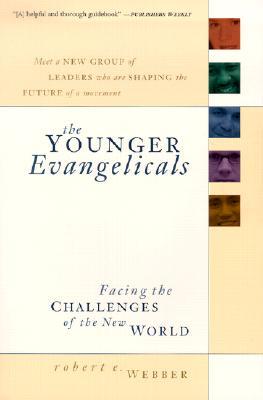- Bible
- Read the Bible
- Bible Versions
- Verse of the Day
- Reading Plans
- Verses by Topic
- Books of the Bible
- Bible Images
- Study
- Commentaries
- Concordances
- Dictionaries
- Encyclopedias
- Sermons
- Bible Atlas & Maps
- BP Wiki
- Devotionals
- Today's Devotionals
- Light of the World
- All Devotionals
- Inspirational Quotes
- More
- Picture Quotes
- Videos
- Inspirational
- Bible Study
- What The Bible Says
- Bible Q&As
- Daily Bread
- Bible by Genre
- Bible Stories
- Random Bible Verse
- Community
- Store
The Younger Evangelicals
by Robert E. Webber
Robert E. Webber has led worship workshops in every major city in the United States and Canada. Through his conversations and contacts with a network of emerging church leaders he calls the "younger evangelicals," Webber sees how this new generation and their style of leadership is bringing change and renewal to the evangelical church. These leaders, who include those young in spirit as well as young in age, have important insights to offer all generations faced with "doing church" in a rapidly changing postmodern culture.
The Younger Evangelicals explores the characteristics of these emerging leaders and provides an outlet for their stories. Beginning with a brief overview of twentieth-century evangelicalism, Webber examines what is different about the twenty-first century younger evangelicals' way of thinking about faith and practicing church. He allows them-Ph.D.s and laypeople-to speak in their own words on issues such as communication, theology, apologetics, pastoral leadership, evangelism, worship, and spiritual formation.
Thought provoking, energizing, and timely, The Younger Evangelicals is a landmark book for pastors and church leaders, culture watchers, ministry students, and worship leaders who want to prepare for and respond to the new evangelical awakening brought on by our changing cultural context.
The Younger Evangelicals explores the characteristics of these emerging leaders and provides an outlet for their stories. Beginning with a brief overview of twentieth-century evangelicalism, Webber examines what is different about the twenty-first century younger evangelicals' way of thinking about faith and practicing church. He allows them-Ph.D.s and laypeople-to speak in their own words on issues such as communication, theology, apologetics, pastoral leadership, evangelism, worship, and spiritual formation.
Thought provoking, energizing, and timely, The Younger Evangelicals is a landmark book for pastors and church leaders, culture watchers, ministry students, and worship leaders who want to prepare for and respond to the new evangelical awakening brought on by our changing cultural context.
BUY NOW
Paperback, 288 pages
Published October 1st 2002 by Baker Books
tags: theology, christian, faith, christianity, church, religion, christian non fiction, nonfiction, cultural
© 2026 Bibleportal.com All rights reserved.

Robert E. Webber (1933 - 2007)
was an American theologian known for his work on worship and the early church. He played a key role in the Convergence Movement, a move among evangelical and charismatic churches in the United States to blend charismatic worship with liturgies from the Book of Common Prayer and other liturgical sources. Webber began teaching theology at Wheaton College in 1968. Existentialism was the primary focus of Webber's research and lectures during his first years at Wheaton. However, he soon shifted his focus to the early church. In 1978 he wrote Common Roots, a book that examined the impact of 2nd-century Christianity on the modern church.In 1985 Webber wrote Evangelicals on the Canterbury Trail: Why Evangelicals Are Attracted to the Liturgical Church, in which he described the reasons behind his own gradual shift away from his fundamentalist/evangelical background toward the Anglican tradition. Webber faced an enormous amount of criticism from evangelicals in response to this book. Nevertheless, his work was highly influential, and his ideas grew in popularity in evangelical circles. During the latter half of his life, Webber took a special interest in Christian worship practices. He wrote more than 40 books on the topic of worship, focusing on how the worship practices of the ancient church have value for the church in the 21st century postmodern era. Among his books are Ancient-Future Worship, Ancient-Future Faith, Ancient-Future Time, Ancient-Future Evangelism, The Younger Evangelicals, and The Divine Embrace.
... Show more